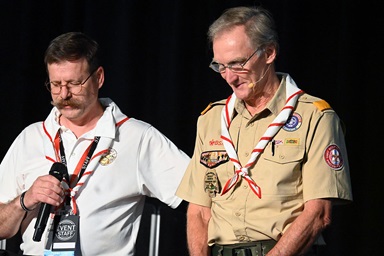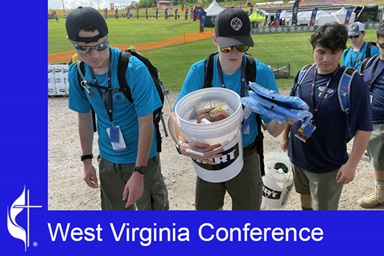Key points
- Negotiators for The United Methodist Church have reached a settlement for the denomination to pay $30 million as part of the Boy Scouts of America bankruptcy reorganization plan.
- Local United Methodist churches have long sponsored Boy Scout and Cub Scout troops, and the $30 million is to go to a fund for survivors of Scouting-related sexual abuse.
- United Methodist negotiators said the settlement will help bring healing to survivors while also providing local United Methodist churches protection from future abuse-related lawsuits.
Negotiators for The United Methodist Church have reached a settlement for the denomination to pay $30 million as part of the Boy Scouts of America’s bankruptcy reorganization plan.
Local United Methodist churches in the U.S. have long been leading sponsors of Boy Scout and Cub Scout troops, and the $30 million is to be paid over three years into a trust fund for survivors of Scouting-related sexual abuse.
All U.S. annual conferences of the denomination are being asked to make a commitment to raise the necessary funds, church leaders said.
The settlement, announced Dec. 21, comes after months of negotiations, and the overall bankruptcy plan still must be approved by a federal bankruptcy court.
United Methodist leaders said the settlement they reached meets key objectives, including bringing healing and support to survivors, and absolving local United Methodist churches that sponsored or chartered BSA troops from abuse claims involving Scouting activities.
In a Zoom call about the settlement, leaders emphasized the denomination’s commitment to survivors.
“We are deeply sorry for the harm that has been caused to good people through Scouting and particularly through ministries of Scouting in United Methodist churches,” said Bishop John Schol, who has had a leading role in representing the denomination in the bankruptcy matter.
Steven Scheid, director of United Methodist Men’s Center for Scouting Ministries, said the settlement commits the denomination to meeting with survivors, hearing and sharing their stories, and to working to boost safety in Scouting programs and other youth work.
“If we’re to be the body of Christ in the world today, it’s our obligation to be a part of the healing that happens,” Scheid said.
The BSA released a statement about the United Methodist settlement.
“This is an extremely important step forward in the BSA and United Methodists’ efforts to equitably compensate survivors, and our hope is that this will lead to further settlement agreements from other parties,” the BSA said.
More than 9,000 United Methodist churches in the U.S. that have a history of chartering Scouting troops are among the parties voting on whether to approve the BSA bankruptcy plan. Those are churches that filed a “proof of claim” in the proceeding, asserting rights to insurance coverage or other protections BSA might have offered.
Earlier this month, the United Methodist negotiators were encouraging those churches to vote “no,” but with the settlement, the churches are asked to vote for the plan. Those that already have voted against it are asked to change their votes, and directions on how to do that are being shared through annual conferences.
The United Methodist Ad Hoc Committee — consisting of eight annual conference chancellors, two bishops, two lawyers from the General Council on Finance and Administration and two staff members from United Methodist Men — oversaw negotiations with lawyers for the BSA and other key parties.
Committee members stressed that under United Methodist polity, they do not have authority to obligate the denomination.
“The Ad Hoc Committee only has the authority to recommend,” Schol said. “The Ad Hoc Committee is recommending to annual conferences the financial settlement and for the annual conferences to commit to raise the funds.”
Each conference is getting a request based on the number of abuse claims filed against its congregations, he added.
Annual conferences will decide for themselves whether and how to follow through, but Schol and others said the settlement represents the best approach for survivors and local churches.
“We could have been looking at many times that ($30 million) amount” if abuse cases were tried in the courts, said George “Buzzy” Anding, Louisiana Conference chancellor and Ad Hoc Committee chair.
U.S. annual conferences already have joined the General Council on Finance Administration in helping pay the fees of lawyers helping the Ad Hoc Committee. Each conference is being asked to contribute $10,000 more for that purpose.
Schol noted that of the $30 million, $2.5 million will, under the settlement terms, be “held back” — and go toward funding legal work needed to make sure United Methodist-related abuse claims filed in state courts are ultimately resolved by payments from the survivors’ fund.
With its future threatened by abuse-related lawsuits, the BSA filed for Chapter 11 bankruptcy in February 2020, seeking to reorganize and carry on.
The BSA reorganization plan has gone through a number of versions, but the heart of it remains a fund that would compensate some 82,000 former Scouts who say they suffered sexual abuse from adult leaders and others.
With contributions from the BSA, local Boy Scout councils, insurance companies and chartering groups, the fund was at $2.6 billion even before the United Methodist settlement. If approved, the plan will represent the largest sex abuse settlement in U.S. history.
The Church of Jesus Christ of Latter-day Saints — known to many as the LDS church or Mormons — had been the largest chartering organization before cutting ties with the BSA. The LDS church agreed in September to contribute $250 million to the survivors’ fund.
The United Methodist Church’s settlement amount is much smaller. But the settlement also calls for the denomination to help raise $100 million for the survivors’ funds from non-United Methodist chartering groups that the Ad Hoc Committed negotiated to include in protection from future abuse-related litigation.
Schol said church leaders will be providing more details about the settlement in a Frequently Asked Questions format. A press release issued just after the Zoom event said the United Methodist Council of Bishops has committed to lead the church as follows:
- Work with all United Methodists to raise funds for the Survivor Trust Fund.
- Tell the story of harm done to survivors through a series of articles to be published by the denomination and by each U.S. annual conference to draw attention to child sexual abuse and call upon the church to be vigilant in working to prevent child sexual abuse in churches, homes and the community.
- Carry out a denomination-wide review of all Safe Sanctuaries and other policies to safeguard young people from sexual abuse, and update policies as necessary and ensure the policies are being followed.
- Provide opportunities for sexual abuse survivors to share their experiences with United Methodist leadership if they choose to do so.
- Work with all United Methodist ministries and with the Boy Scouts of America to continue to make programs safe for all young people.
- Provide leadership to help all BSA chartering organizations make a $100 million contribution to the Survivor Trust Fund.
- Participate as a member of the Survivors Working Group.
Bishop Tracy Smith Malone joined other church leaders in the Zoom meeting in stressing the importance of serving abuse survivors.
“This was the cornerstone of our mediation and settlement,” she said.
The United Methodist Church and predecessor denominations have worked with BSA for more than 100 years.
As of 2020, United Methodist Men — the agency overseeing the denomination’s Scouting ministries — reported that more than 3,000 United Methodist churches in the U.S. chartered about 9,000 scouting units, involving 300,000 youth.
Schol said advice will be coming soon for local churches about their relationships with Scouting troops.
“We all hope that the church and BSA will continue to serve young people in programs that grow young people and keep young people safe from harm,” he said.
Hodges is a Dallas-based writer for United Methodist News. Contact him at 615-742-5470 or newsdesk@umcom.org. To read more United Methodist news, subscribe to the free Daily or Weekly Digests.




